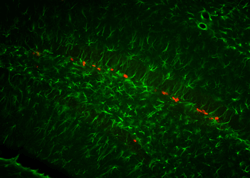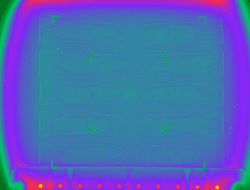URMC / Labs / O'Banion-Olschowka Labs / Projects / Low-Dose-Radiation-Effects-on-Hippocampal-Neurogenesis
Low Dose Radiation Effects on Hippocampal Neurogenesis
Project Collaborators:
Dr. Jacob Finkelstein & Dr. Jacqueline Williams

Neurogenesis in the adult hippocampus (BrdU
red labeled dividing cells; Astrocytes green.
The biological effects of low dose radiation exposure are poorly understood. Yet, large segments of the population receive significant doses of radiation from routine CT scans. In addition, the cumulative effects of low dose radiation on radiation workers, astronauts, and persons exposed to radiological disasters are of critical importance in establishing health risks and exposure related policies. A sensitive indicator of radiation exposure in the CNS is hippocampal neurogenesis, the process by which new neurons are born in the adult brain. We hypothesize that this process is sensitive to direct DNA damage as well as local changes in the microenvironment elicited by glial reaction to radiation.

HZE radiation exposure.
The main goal of this project funded jointly by the Department of Energy Low Dose Radiation and NASA Space Radiation Biology Programs is to establish lower radiation dose limits for effecting hippocampal neurogenesis in young adult mice. Experiments are being carried out with two types of radiation: gamma irradiation, which is used for radiation therapy; and high energy particle irradiation (HZE), modeling possible effects of cosmic radiation that will be encountered by astronauts traveling to the moon and Mars. Work from our laboratory and others demonstrates clear differences in CNS injury by these two forms of radiation. In order to better understand tissue changes associated with radiation induced inhibition of hippocampal neurogenesis, we are also carrying out gene array analysis of brain tissue at different times following radiation exposure.
« back to all projects